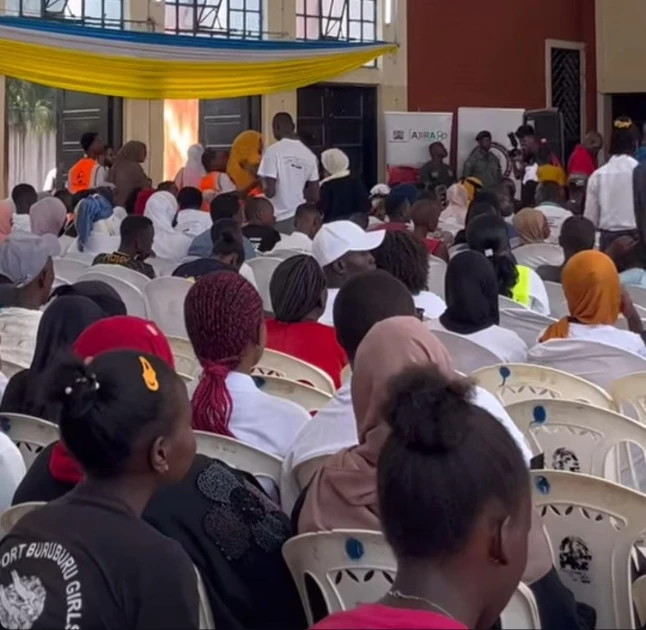OPINION: Powering the Future - Why youth are Kenya’s most valuable investment

Mombasa International Youth Day Celebrations.

Audio By Carbonatix
President William Ruto recently emphasized that "our youth are not just job seekers but job creators." With 80% of Kenya’s population under the age of 35, the nation holds an unmatched demographic advantage to drive the Sustainable Development Goals (SDGs) and unlock economic prosperity.
The 2025 Kenya Economic Survey shows that over 2.4 million Kenyans are already earning through digital work. Building on this momentum, the government is accelerating skilling programs, promoting innovation, and nurturing youth-led enterprises to create wealth, reduce unemployment, and position Kenya as a hub for inclusive and technology-driven growth.
The country is
already witnessing digital transformation across various sectors, and it is
increasingly clear that young people are not just beneficiaries of innovation
but architects of a new, inclusive future. From digital hubs, freelancing
desks, and Business Processing Outsourcing (BPO) centres to mentorship circles,
Kenya’s youth are using technology not only to earn a living but also to
reshape society itself.
Take, for example, members of the Ajira Digital Club at Emining Training Institute in Baringo County, who started as online gig workers doing microtasks on various platforms to earn a few dollars to cater to their needs while in school.
As
their online work advanced—and with the right mentorship—they took their
digital craft a notch higher by developing an e-commerce website that connects
their local community to global markets for selling honey. This is proof that when
skills, mentorship, and infrastructure align, the ripple effect can transform
entire communities.
This year’s
International Youth Day theme, Local Youth Actions for the SDGs and Beyond,
resonates deeply with Kenya’s current reality. It highlights the powerful shift
from youth advocacy to tangible action, a shift that is unfolding in real time.
Technology has become the great equalizer, enabling young people to bypass
traditional gatekeepers, innovate at the grassroots level, and create solutions
that respond directly to their lived realities.
One such
example is the Ajira Digital Program, a government initiative implemented by
the Ministry of ICT and the Digital Economy in partnership with eMobilis,
KEPSA, and the Mastercard Foundation. This initiative has so far equipped over
500,000 young people with basic, intermediate, and advanced digital skills—from
AI for graphic design, financial markets, and virtual assistance to e-commerce
and software development. Of those trained, 60% have secured work either through
online freelancing platforms or digital-enabled enterprises.
These aren’t just statistics—they represent lives transformed. In some of Kenya’s most remote counties, such as Turkana and Taita Taveta, digital hubs have become lifelines, providing young people with access to reliable internet, computers, and dedicated workstations to earn a living online.
In these spaces, youth
trained and mentored through the Digital Entrepreneurship Accelerator Program
under Ajira are not only securing freelance work but also establishing thriving
BPO ventures that are revitalizing their local economies.
According to 2025 Emerging Trends
by TIFA, commissioned by Ajira Digital, over 2.4 million Kenyans now earn part
or all of their income through digital work—an exponential rise from just 1.3
million in 2021. However, a significant portion of youth in rural and
underserved areas still face unequal access to the internet, devices, and
mentorship. Women, youth with disabilities, and young people living in informal
settlements frequently struggle to access digital opportunities.
To bridge this divide, the country must scale up community-based innovation hubs, invest in inclusive infrastructure, and provide localized content and training in languages and formats that resonate with diverse groups. Digital skilling must also become part of basic education.
Coding, data literacy, content creation,
and AI ethics should no longer be reserved for tech colleges—they must be
mainstreamed across primary and secondary curricula. Only then can we
future-proof the next generation of digital citizens.
Moving Towards Policy
Influence
Kenya has no
shortage of progressive policies aimed at driving youth inclusion and
innovation—from the Digital Economy Blueprint and the Ajira Digital Program to
the Kenya Youth Employment and Opportunities Project (KYEOP) and the
Presidential Digital Talent Programme. These frameworks are laying the
groundwork for local youth actions that go beyond the SDGs, creating pathways
for young people to turn ideas into impact.
Government
and development partners have invested in digital hubs, skilling programs, and
innovation challenges across the country, ensuring that even those in rural and
underserved areas can plug into the digital economy. Initiatives like Ajira’s
mentorship program, Konza Technopolis’ innovation clusters, and youth-driven
public-private partnerships are catalyzing job creation, entrepreneurship, and
community-led solutions.
However, to
truly unlock the potential of these efforts, young people must not only be
beneficiaries but also co-creators of policy. By embedding youth voices into
decision-making platforms such as tech advisory councils and legislative
consultations—and by valuing grassroots innovation alongside corporate
proposals—Kenya can ensure its digital economy is inclusive, future-ready, and
firmly rooted in local realities.
A Future Built With, Not Just
For, Youth
Kenya is
uniquely positioned to become a global leader in youth-driven innovation. With
over 80% of the population under 35, the country enjoys an unparalleled
demographic advantage. Across the nation, tech communities are already
translating youth ambition into tangible impact—creating jobs, fostering entrepreneurship,
and sparking innovations that address both local and global challenges.


Leave a Comment